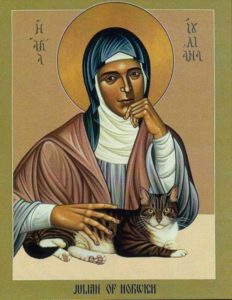Here is the adult study lesson that would have been taught last Wednesday night, 3/25/20, at church. Read it over and ponder it. Discuss it with your spouse, or as a family. Read it over coffee tomorrow. Whatever works for you!
St. Julian of Norwich, Mystic and Theologian

Dates: 1342-1416 AD
Locations: Norwich, England
Feast Day: May 8
Context: Dame Julian of Norwich was a medieval English anchoress and mystic whose book Revelations of Divine Love is the oldest surviving book in the English language written by a woman. Very little is known about the biographical details of her life. Even her real name is not certain: her name may have been taken from the parish with which she was associated, St. Julian’s Church in Norwich. She was born in the English city of Norwich in 1342, and she remained there her entire life. Julian lived through a tumultuous time in English history, which included the Black Death, the Peasants’ Revolt of 1381, and the Catholic Church’s suppression of the reforming Lollard movement. Julian became seriously ill at the age of thirty and was expected to die. When a priest came to administer Last Rites to her, she had a series of sixteen revelations, or “showings,” in which Christ revealed to her his love for creation, the nature of sin, and the details of his Passion. After she recovered, she wrote these revelations down, and over the next few decades wrote theological reflections on these visions. During this time she lived as an anchoress, a monastic who lives a life of seclusion and prayer in a cell attached to a parish church. Her theology is characterized by its great optimism and its emphasis on the omnibenevolence of God, whom she often likens to a nurturing mother. Her unbounded hope in God is seen in her oft-cited proclamation that “all shall be well, and all shall be well, and all manner of things shall be well.”
Excerpts from: ‘Revelations of Divine Love’
“…he showed me a little thing, the size of a hazelnut, lying in the palm of my hand, it seemed, and it was as round as any ball. I looked thereupon with the eye of my understanding, and I thought, ‘What may this be?’ And it was answered generally thus: ‘It is all that is made.’ I wondered how it could last, for I thought it might suddenly fall to nothing for little cause. And I was answered in my understanding: ‘It lasts and ever shall, for God loves it; and so everything has its beginning by the love of God.’ In this little thing I saw three properties: the first is that God made it; the second is that God loves it; and the third is that God keeps it.”
“…with this our good Lord said full blissfully, “Lo, how that I loved thee,” as if He had said, “My darling, behold and see thy Lord, thy God that is thy Maker and thine endless joy, see what satisfaction and bliss I have in thy salvation; and for my love rejoice thou with me.” And also, for more understanding, this blessed word was said: “Lo, how I loved thee! Behold and see that I loved thee so much ere I died for thee that I would die for thee; and now I have died for thee and steered willingly that which I may. And now is all my bitter pain and all my hard travail turned to endless joy and bliss to me and to thee. How should it now be that thou shouldst anything pray that pleaseth me but that I should full gladly grant it thee? For my pleasure is in thy holiness and thine endless joy and bliss with me.” This is the understanding, simply as I can say it, of this blessed word: “Lo, how I loved thee.”
Discussion Questions:
- What are your beliefs and feelings about divine love?
- Julian writes that all of creation is made by God, loved by God, and kept by God. Apply this to yourself: how does it affect the way you live if you know that God made you, God loves you, and God keeps you?
- What do you think of Jesus’ address to Julian in the second excerpt? Have you ever heard Jesus speaking to you in this way?
- Julian reports that Jesus says to her that it is his joy to grant our prayers. Why do you think it sometimes seems as if God doesn’t answer our prayers?


Comments are closed.